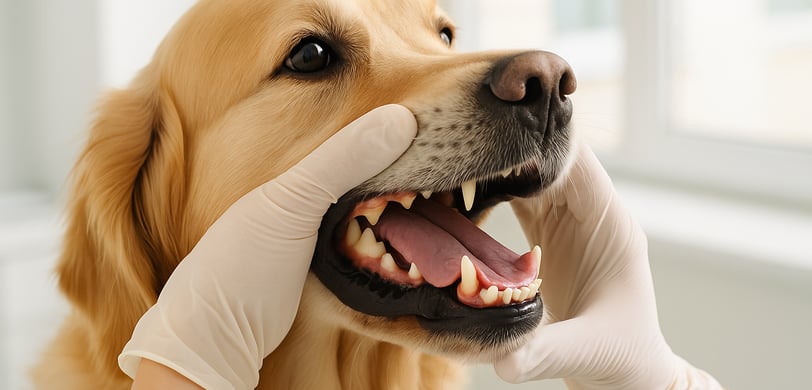Why Your Dog’s Fishy Breath Could Be a Serious Warning Sign
4/20/20255 min read


Understanding Halitosis in Dogs
Halitosis, commonly known as bad breath, is a condition that affects many dogs and can be indicative of underlying health issues. This unpleasant odor is not only socially undesirable but also serves as a potential warning sign of more serious problems. Dogs may experience various types of halitosis, with some odors being more concerning than others. For instance, while a sweet or fruity breath may indicate diabetes, a bad fishy breath is often associated with dental disease or other significant health complications.
The prevalence of halitosis in dogs is notable; studies show that approximately 80% of dogs over the age of three develop some form of periodontal disease, which is a leading cause of bad breath. With such high statistics looming over pet owners, it becomes crucial to understand the causes and implications of halitosis. One of the primary contributors to halitosis is the buildup of plaque and tartar on the teeth. When bacteria proliferate in the mouth, they generate a foul smell, resulting in an unpleasant odor that can be perceived as fishy, among other aromas.
In addition to dental issues, certain medical conditions involving the kidneys or liver can also result in a fishy breath in dogs. These organs play an essential role in filtering waste and toxins from the bloodstream, and when they are not functioning correctly, the byproducts of corrupted metabolic processes can lead to noticeable changes in breath odor. Thus, if a dog has persistent fishy breath, prompt veterinary attention is necessary to rule out potential underlying health issues.
In summary, understanding halitosis in dogs involves not just identifying types of bad breath but also recognizing the serious health implications that may arise from them. Being vigilant about your pet's oral health will not only improve their breath but also contribute to their overall well-being.
Potential Health Issues Associated with Fishy Breath
When a dog's breath carries a distinctly fishy odor, it could be a sign of underlying health issues that warrant immediate attention. One of the primary concerns associated with this condition is dental disease. Dogs can develop periodontal disease, which encompasses inflammation of the gums and the destruction of the surrounding structures due to the accumulation of plaque and tartar. Symptoms may include swollen gums, bleeding, and, of course, persistent bad breath. If not treated promptly, dental disease can lead to pain and tooth loss, ultimately affecting the dog's overall wellbeing.
Another significant health issue linked to fishy breath is kidney dysfunction. Dogs experiencing kidney problems may exhibit a range of symptoms, including excessive thirst and urination, weight loss, and a decline in appetite. The fishy odor arises due to the accumulation of waste products in the bloodstream when kidneys fail to function properly. These waste products can be toxic, making it critically important for dog owners to seek veterinary intervention as soon as they notice odor changes in their pet's breath.
Additionally, gastrointestinal issues can also contribute to a dog's bad fishy breath. Conditions such as gastroesophageal reflux or bacterial overgrowth in the intestine can lead to abnormal foul smells. Symptoms may include vomiting, diarrhea, or an unusual appetite. Recognizing these signs promptly is vital; gastrointestinal problems can escalate into more severe health concerns if left unaddressed. These ongoing health issues highlight the importance of regular veterinary examinations and prompt diagnosis for dogs displaying unusual breath odors. Dog owners should not ignore the significance of fishy breath, as it could serve as a critical warning sign of potential health risks.
When to Seek Veterinary Care
Recognizing when to seek veterinary care for your dog’s fishy breath is crucial for maintaining their overall health. While it is not uncommon for dogs to experience occasional bouts of halitosis, persistent fishy breath can be indicative of underlying health issues that require professional attention. One of the first signs to watch for is the duration and intensity of the odor. If the fishy breath lasts more than a few days or grows noticeably worse, it is advisable to consult a veterinarian.
Additionally, pay close attention to accompanying symptoms such as excessive drooling, difficulty chewing, or changes in appetite. If your dog exhibits any unusual behaviors, such as lethargy or sudden aggression, these can be red flags suggesting that the underlying cause might be serious. Conditions like periodontal disease, gastrointestinal problems, or infections can manifest as foul breath, and early detection through veterinary care can prevent further complications.
When preparing for a vet visit, it helps to keep a log of your dog’s symptoms, any dietary changes, and how long the bad fishy breath has persisted. This information will assist the veterinarian in diagnosing the issue more effectively. You might also want to bring along samples of your dog’s food or treats to help the vet assess potential dietary contributions to the bad breath. Documentation of any previous medical history, including dental cleanings or past health issues, can provide a comprehensive picture for the veterinarian.
In summary, if you notice your dog has a persistent fishy breath paired with other concerning symptoms, it is imperative to seek veterinary care promptly. Early intervention can significantly improve your dog’s health outcomes and overall quality of life.
Preventative Measures and Oral Health Tips
Maintaining good oral health for your dog is crucial to preventing halitosis and ensuring their overall well-being. Regular veterinary dental check-ups should be a top priority for pet owners. It's recommended that dogs receive professional dental cleanings at least once a year, depending on their dental health and age. During these visits, a veterinarian can assess the condition of your dog's teeth and gums, clean tartar buildup, and identify potential issues that may lead to more severe health problems if left untreated.
In addition to professional care, appropriate diet choices play a key role in oral hygiene. Opting for high-quality dog food specifically designed to promote dental health can help reduce plaque and tartar formation. Some brands offer formulas that are crunchy or specifically designed to scrub the teeth as the dog chews, which can help in mechanically cleaning the teeth and freshening their breath. Consult your veterinarian for recommendations tailored to your dog's specific dietary needs.
At-home oral care is equally important. Incorporating dental chews into your dog's routine is an effective way to support oral health. These chews are designed to reduce plaque and freshen breath while satisfying your dog's natural chewing instincts. Furthermore, providing your dog with toys that promote chewing can also aid in maintaining dental hygiene. Regularly brushing your dog's teeth is highly encouraged, using toothpaste specifically formulated for dogs. Gradually introduce this habit to your pet to ensure they become comfortable and receptive to the process.
Finally, don't overlook the importance of routine inspections of your dog's mouth at home. Look for any signs of gum inflammation, unusual growths, or discoloration, and address any concerns with your veterinarian promptly. By implementing these preventative measures and oral health tips, dog owners can successfully maintain their furry friends' breath and overall health, keeping them happy and vibrant.


Explore
Join our community for tips and adventures.
Connect
Inspire
© 2025. All rights reserved.


